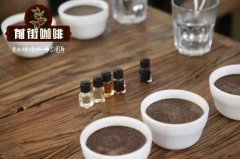Growth Environment and Flavor characteristics of Yunnan Coffee Variety-Kadim Catimor

Professional coffee knowledge exchange more coffee bean information please follow the coffee workshop (Wechat official account cafe_style)
Katim (English name Catimor)
Yunnan small grain coffee
Yunnan small-grain coffee, Rubiaceae, coffee genus, the planting area is mainly distributed in Lincang, Baoshan, Simao, Xishuangbanna, Dehong and other states. Small grains of coffee are native to Ethiopia or Arabian Peninsula.
Main producing area
Small-grain coffee is suitable for growing in the mountains at an altitude of 800 to 1800 meters. If the altitude is too high, it will taste sour, and if it is too low, it will taste bitter. Small grains of coffee are mostly planted in dry and hot valleys about 1100 meters above sea level, so they are moderately sour, rich and mellow. There is a unique environment suitable for the growth of small seed coffee in many areas of Yunnan, and the quality of small seed coffee is excellent.
The planting areas are mainly distributed in Lincang, Baoshan, Simao, Xishuangbanna, Dehong and other states. The average temperature of Baoshan is 21.5℃, and the highest is 40.4℃, which is basically frost-free all the year round. It is recognized as the best producing area of small-grain coffee. The small-grain coffee cultivated here is famous at home and abroad for its strong but not bitter, fragrant but not strong, well-proportioned small noodles, mellow and fruity. International Coffee Organization tasting experts evaluate Yunnan coffee as the highest quality coffee in the world, such as Colombian wet-processed small-grain coffee.
Variety
Typica: the oldest native variety in Ethiopia and southeastern Sudan. All Arabikas are derived from Tibika. The flavor is elegant, but the physique is weak, the disease resistance is poor, the fruit yield is less. Excellent manor beans such as the Blue Mountains of Jamaica, Manning of Sumatra and Kona of Hawaii all belong to Tibika. Tiebika top leaf is red copper, called red top coffee, Tibika belongs to Arabica.
Catimor: in 1959, the Portuguese mixed Brazilian Kaddura and Timo to develop a disease-resistant Katim / Katimo, which is now an important variety of commercial beans.
Growing period
Yunnan small grain coffee 3-year-old 4-year-old fruit tree.
Coffee is a short-day plant. Coffee has the characteristics of multiple flowering and concentrated florescence. The florescence of small seed coffee in Yunnan is from February to July, and the flowering period is from March to May. The flowering of coffee is greatly affected by climate, especially rainfall and temperature. Coffee flowers have a short life span of only 2-3 days. Small seed coffee usually opens at 3: 5 in the morning and blooms from 5 to 7 o'clock.
Katim is a hybrid of Kaddura and Timor-don't be confused with Kaddura and Kaduai. This highly resistant plant has the ability to resist coffee leaf rust, so it was widely planted in Latin American countries in the 1980s. Unfortunately, because the Timorese species (also known as the Alabasta species) is the product of a natural cross between the Tibica Arabica species and the Robusta species, although the latter can give it disease resistance, the delicate taste of the Arabica varieties has disappeared.
Katim CIFC7963 (F6) is widely popularized and planted in Dehong, Baoshan, Pu'er, Xishuangbanna, Lincang, Wenshan, Yuxi and other coffee growing areas in Yunnan Province, as well as Panzhihua in Sichuan Province and neighboring Myanmar, with a total promotion area of more than 200,000 mu.
The annual average temperature is 19 ℃ ℃, the accumulated temperature of 10 ℃ is more than 6800 ℃, the coldest monthly average temperature is more than 11.5 ℃, the absolute lowest temperature is above 1 ℃, the coldest monthly mean temperature is ≥ 11.5 ℃, the monthly mean temperature of ≤ 13 ℃ is more than two months, the extremely lowest general year is above 0 ℃, and some years appear-1 ℃ or short-2 ℃. Below 1200 meters above sea level, the annual rainfall is ≥ 1100 mm; the soil is fertile loam, the soil is loose, the drainage is good, the PH value is 6 Murray 6.5, the sunny slope is less than 25 °and the terrace is planted.
Katim CIFC7963 (F6) is widely popularized and planted in Dehong, Baoshan, Pu'er, Xishuangbanna, Lincang, Wenshan, Yuxi and other coffee growing areas in Yunnan Province, as well as Panzhihua in Sichuan Province and neighboring Myanmar, with a total promotion area of more than 200,000 mu.
The annual average temperature is 19 ℃ ℃, the accumulated temperature of 10 ℃ is more than 6800 ℃, the coldest monthly average temperature is more than 11.5 ℃, the absolute lowest temperature is above 1 ℃, the coldest monthly mean temperature is ≥ 11.5 ℃, the monthly mean temperature of ≤ 13 ℃ is more than two months, the extremely lowest general year is above 0 ℃, and some years appear-1 ℃ or short-2 ℃. Below 1200 meters above sea level, the annual rainfall is ≥ 1100 mm; the soil is fertile loam, the soil is loose, the drainage is good, the PH value is 6 Murray 6.5, the sunny slope is less than 25 °and the terrace is planted.
Katim CIFC7963 (F6) is widely popularized and planted in Dehong, Baoshan, Pu'er, Xishuangbanna, Lincang, Wenshan, Yuxi and other coffee growing areas in Yunnan Province, as well as Panzhihua in Sichuan Province and neighboring Myanmar, with a total promotion area of more than 200,000 mu.
The annual average temperature is 19 ℃ ℃, the accumulated temperature of 10 ℃ is more than 6800 ℃, the coldest monthly average temperature is more than 11.5 ℃, the absolute lowest temperature is above 1 ℃, the coldest monthly mean temperature is ≥ 11.5 ℃, the monthly mean temperature of ≤ 13 ℃ is more than two months, the extremely lowest general year is above 0 ℃, and some years appear-1 ℃ or short-2 ℃. Below 1200 meters above sea level, the annual rainfall is ≥ 1100 mm; the soil is fertile loam, the soil is loose, the drainage is good, the PH value is 6 Murray 6.5, the sunny slope is less than 25 °and the terrace is planted.
Yunnan coffee varieties are mainly mixed-race Katim infected with Robusta gene, which is very different from Taiwan's traditional Tibika, but interestingly, the notorious Katim has won the top 10 in the domestic Yunnan raw bean competition. on the contrary, it is the delicious varieties of Tiebika and Geisha, which are both defeated. Yunnan Katim seems to be something to be reckoned with. Ted Lingle, a senior consultant to CQI in the United States, said that the Katim species in Yunnan Province can increase aroma and extract alcohol at a high altitude of more than 1500 meters, coupled with appropriate post-processing, the color of the taste spectrum will not lose to the traditional old varieties.
The average temperature in Baoshan is 21.5 ℃, the highest is 40.4 ℃, and there is almost no frost all the year round.
East Timor was colonized by Portugal for 400 years, and the Portuguese had long been in contact with East Timorese coffee trees.
In 1959, the Portuguese moved the Brazilian bourbon mutant Kaddura to East Timor to mix with Tim timor, who was of Robusta descent, and unexpectedly succeeded in breeding Kadim with disease resistance and super production capacity. As leaf rust affects coffee producing countries around the world, with the help of international organizations, various producing countries vigorously promote Kadim to fight leaf rust and increase production capacity. Although Katim inherits the advantages of Robusta's strong disease resistance, Katim coffee beans always have a "devil's tail rhyme" at the end because they are infected with the Luo bean gene. This batch of Katim in Yunnan is planted at a high altitude of more than 1500 meters, coupled with appropriate post-processing, with reference to the African elevated bed sun-drying cherry treatment, the aroma of coffee beans is balanced with mugi-cha aroma and low acidity, bitterness and sour taste.

Important Notice :
前街咖啡 FrontStreet Coffee has moved to new addredd:
FrontStreet Coffee Address: 315,Donghua East Road,GuangZhou
Tel:020 38364473
- Prev

Why is the fruity Brazilian Hillado coffee beans so popular?
Professional coffee knowledge exchange more coffee bean information please follow the coffee workshop (Wechat official account cafe_style) semi-washed coffee is mainly produced in the Hirado area! Its characteristic is that the coffee beans are not impregnated by the fermentation tank. The acidity, sweetness, taste and flavor of this coffee are quite good. According to coffee experts, semi-washed coffee beans are used.
- Next

Matali ancient method of sun treatment-the taste and brewing methods of Yemeni mocha boutique coffee?
For more information on coffee beans, please follow the history of Yemen in the coffee workshop (Wechat official account cafe_style): Yemen, famous for its frankincense or spice trade, is the origin of the earliest coffee mocha in the world. Yemen, which retained its way of life thousands of years ago, and Ethiopia, which is across the sea from Yemen, also sells coffee through the port of Mocha.
Related
- Detailed explanation of Jadeite planting Land in Panamanian Jadeite Manor introduction to the grading system of Jadeite competitive bidding, Red bid, Green bid and Rose Summer
- Story of Coffee planting in Brenka region of Costa Rica Stonehenge Manor anaerobic heavy honey treatment of flavor mouth
- What's on the barrel of Blue Mountain Coffee beans?
- Can American coffee also pull flowers? How to use hot American style to pull out a good-looking pattern?
- Can you make a cold extract with coffee beans? What is the right proportion for cold-extracted coffee formula?
- Indonesian PWN Gold Mandrine Coffee Origin Features Flavor How to Chong? Mandolin coffee is American.
- A brief introduction to the flavor characteristics of Brazilian yellow bourbon coffee beans
- What is the effect of different water quality on the flavor of cold-extracted coffee? What kind of water is best for brewing coffee?
- Why do you think of Rose Summer whenever you mention Panamanian coffee?
- Introduction to the characteristics of authentic blue mountain coffee bean producing areas? What is the CIB Coffee Authority in Jamaica?

